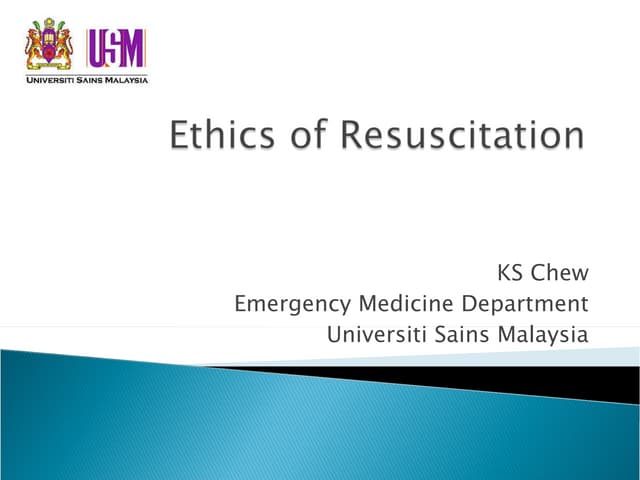Do not resuscitate ethics

Do not resuscitate information? What is do not resuscitate? Do Not Resuscitate order (DNR)? Little did Dr DeBakey know that he was about to make history yet again: not by pioneering another surgical procedure, but by becoming the center of an ethical debate about perioperative care in the elderly who have do not resuscitate (DNR) orders. If your father is not competent to make medical decisions for himself, then you need.
These apprehension s are present because of the uncertainties that lay between the doctors and family for the decision-making authority over the patient. There are circumstances in which an order not to resuscitate may properly be issued in connection with the care of a patient. This is a legal order which tells a medical team not to perform CPR on a patient. However this does not affect other medical treatments. Ethical debate ‘remains unsettled’ Physicians are evenly divided as to whether unilateral do not resuscitate (DNR) orders — decisions about resuscitation made by doctors without patient or surrogate consent — are appropriate, found a recent study.
If a patient is designated ‘DNR’, CPR is withhel allowing them to die without a resuscitation attempt. Muslims cannot kill, or be complicit in the killing of. DNR orders relate only to CPR and should not affect other treatments.
Since we are concerned not simply with codes, but with ethics as well, we need to look at how professional codes relate to ethics , and at how useful they are when making moral decisions. Abstract During the cardio-pulmonary resuscitation (CPR) two elements can occur, restricting the application of the basic ethical principles and possibly leading to conflict: the emergency of the. Sometimes it also prevents other medical interventions. DNRmeans do not resuscitate.
Only a doctor can write an order for a patient to be “no code. Do-not-resuscitate (DNR) laws are one of the successes of the bioethics movement, which replaced the traditional model of physician-dominated paternalism with an emphasis on patients’ rights. Lerner Let’s talk about dying, medicine’s dirty little secret.
A suicidal person with a do - not - resuscitate (DNR) order presents an ethical dilemma to the emergency physician. Many believe that suicide is an irrational action, and therefore, all suicide attempts must be treated. Others believe a DNR order should be respected even in the setting of a suicide attempt.
In addition, there still exists confusion regarding do - not - resuscitate orders and related terminology. This statement provides ethical guidance for nurses in the do - not - resuscitate decision-making process and makes recommendations for clinical and policy change. A do not resuscitate (DNR) order is the order for healthcare providers not to perform CPR on a patient with cardiac arrest. DNRs, DNARs, and DNACPRs are all abbreviations referring to an advance decision made by medical staff not to attempt cardiopulmonary resuscitation (CPR) on a patient who has stopped breathing, or whose heart has stopped. A DNR is a legal document in which health care teams will follow once you are faced with serious health problems or when you are at the end of life.
This document lets you choose if you would like CPR or electric shock if your heart stops. Chang Y, Huang CF, Lin CC. Bradford MA, Lindenauer PK, Wiener RS, et al. Do - not - resuscitate orders for critically ill patients in intensive care.
Introduction: DNR is considered one of ethical dilemma in modern society that resulted from medical development, ethical dilemmas occur in the field of health care when health care providers in a situation to choose between two or more unfavorable alternative. A do - not - resuscitate order, or DNR order, is a medical order written by a doctor. The ICU team decided to honor the preference expressed in the tattoo.
A DNR order is create or set up, before an emergency occurs.
Comments
Post a Comment